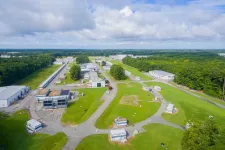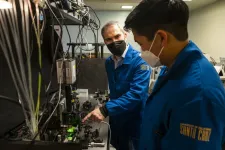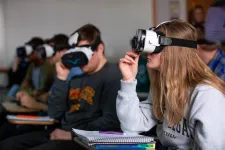(Press-News.org) Dr. Zhijian “Z.J.” Pei and his intercollegiate team recently received the Future Manufacturing Research Grant from the National Science Foundation’s Future Manufacturing program, which funds researchers to develop new manufacturing capability that does not exist today. The focus of this research grant is to substitute products made from petroleum-based plastics or natural wood with biomass.
“Our idea is to use living matter, including fungi, algae, bacteria, plus agriculturally derived biomass and use 3D printing to make products,” said Pei, professor in the Wm Michael Barnes ’64 Department of Industrial and Systems Engineering at Texas A&M University.
While 3D printing with living matter, or bioprinting, is in use in health-related applications, Pei said his main applications are in packaging, furniture and construction industries.
“This is good for society and good for the environment,” Pei said. “Potentially, because these materials are locally available, we can create domestic jobs as well.”
The research team is interdisciplinary and includes experts from manufacturing, biology, civil and environmental engineering and mechanics. Other primary investigators of this project are Dr. Chiara Daraio from the California Institute of Technology (Caltech), Dr. Qiming Wang from the University of Southern California and Dr. Brian Shaw and Dr. Shawna Fletcher from Texas A&M. Among their collaborators are the Texas A&M Engineering Experiment Station’s (TEES) Workforce Development office, America Makes and the Association for Manufacturing Technology.
Each university brings a unique angle to the project. Pei is working on fungi-biomass composites, Caltech works on algae-biomass composites and the University of Southern California studies bacteria and biomass.
Along with the research, the team will create educational components as part of the grant including a textbook, an undergraduate student research program and training program for people working in the industry.
“Traditionally, manufacturing is mass production in one location,” Pei said. “It makes millions of parts and then ships them to different places. 3D printing is more suitable for distributed manufacturing — a small quantity of product is made at different places.”
Pei said support from departments, colleges and TEES is critical for successful proposals.
By Jennifer Reiley, Texas A&M Engineering
###
END
Texas A&M researcher receives $3M National Science Foundation manufacturing grant
Team to test 3D printing living matter to substitute for petroleum-based plastics
2023-05-02
ELSE PRESS RELEASES FROM THIS DATE:
Crossroads: The role of biomarkers in the management of lumps in the breast
2023-05-02
“A biomarker or set of biomarkers to inform on the individual progression risk would be beneficial to the patient and cost-effective for the healthcare system."
BUFFALO, NY- May 2, 2023 – A new research perspective was published in Oncotarget's Volume 14 on April 24, 2023, entitled, “Crossroads: the role of biomarkers in the management of lumps in the breast.”
Here, Dr. Georg F. Weber from the University of Cincinnati Academic Health Center discusses a long-standing issue in women’s health: ...
Openseize: A novel open-source software to analyze large-scale digital signals
2023-05-02
Electroencephalography (EEG) is an indispensable tool used by clinicians to diagnose neurological diseases and by researchers to study and discover brain circuit mechanisms that support sensory, mnemonic, and cognitive processing. A new software - Openseize - created by Dr. Matthew Caudill, an investigator at the Jan and Dan Duncan Neurological Research Institute at Texas Children’s Hospital and assistant professor at Baylor College of Medicine, can now analyze massive amounts of one-dimensional digital ...
JSA Awards $558K for Initiatives Fund Program for FY2023
2023-05-02
WASHINGTON, DC – Jefferson Sciences Associates (JSA) has announced the award of $558,060 through its JSA Initiatives Fund Program. The program supports projects by staff and scientific users at the U.S. Department of Energy’s Thomas Jefferson National Accelerator Facility. The FY23 program awards leveraged over $800,000 in matching funds, and taken together, the program and matching awards total over $1.3 million. Project awards include scientific meeting support, education and career development, and outreach activities, ...
Deep neural network provides robust detection of disease biomarkers in real time
2023-05-02
Sophisticated systems for the detection of biomarkers — molecules such as DNA or proteins that indicate the presence of a disease — are crucial for real-time diagnostic and disease-monitoring devices.
Holger Schmidt, distinguished professor of electrical and computer engineering at UC Santa Cruz, and his group have long been focused on developing unique, highly sensitive devices called optofluidic chips to detect biomarkers.
Schmidt’s graduate student Vahid Ganjalizadeh led an effort to use machine learning to enhance ...
How the brain's dopamine circuitry helps regulate cognitive flexibility and reward-seeking
2023-05-02
The Brain & Behavior Research Foundation (BBRF) is hosting a free webinar, “How the Brain's Dopamine Circuitry Helps Regulate Cognitive Flexibility and Reward-Seeking” on Tuesday, May 9, 2023, at 2:00 pm EST. The presenter will be Nikhil Urs, Ph.D., Assistant Professor of Pharmacology and Therapeutics at the University of Florida and a recipient of a 2018 BBRF Young Investigator Grant. The webinar will be hosted by Jeffrey Borenstein, M.D., President & CEO of the Brain & Behavior Research Foundation, and host of the public television series Healthy Minds.
Register today at BBRFoundation.org
Dopamine ...
AI in medical imaging could magnify health inequities, study finds
2023-05-02
Artificial intelligence (AI) technology in the medical field has the possibility to automate diagnoses, decrease physician workload, and even to bring specialized healthcare to people in rural areas or developing countries. However, with possibility comes potential pitfalls.
Analyzing crowd-sourced sets of data used to create AI algorithms from medical images, University of Maryland School of Medicine (UMSOM) researchers found that most did not include patient demographics. In the study published April 3 in Nature Medicine, the researchers also found that the algorithms did not evaluate for inherent biases either. That means they have ...
Cybersickness more likely to affect women, ongoing research to understand why
2023-05-02
AMES, IA — Iowa State researchers in psychology and engineering found women experience cybersickness with virtual reality headsets more often than men. Their ongoing work, supported by a new $600,000 grant from the National Science Foundation, explores why this difference exists and options to help individuals adapt.
Psychology professor Jonathan Kelly studies human computer interaction, spatial cognition and virtual reality. He says gender discrepancies in cybersickness may not seem that important when it’s related to video games and other forms of entertainment.
"But it’s still a problem, and when VR gets to the point ...
A method to access genetic information in blood samples and find correlations with mental health problems
2023-05-02
Using blood samples to study diseases that originate in the brain is a difficulty faced by psychiatric genetics in the search for markers of mental health disorders. Researchers at the Federal University of São Paulo (UNIFESP) in Brazil have shown that this hindrance can be surmounted by analyzing microRNAs in extracellular vesicles (EVs), which are produced by most cells in the body, including neurons and other nervous system cells.
The study was supported by FAPESP and is reported ...
Air pollution may increase risk of dementia, complicated by genetics
2023-05-02
Three years ago, an international study commissioned by the journal Lancet listed 12 modifiable factors that increased the risk of dementia, including three new ones: excessive alcohol, head injury and air pollution.
Writing in the May 2, 2023 issue of the Journal of Alzheimer’s Disease, a team of researchers, led by scientists at University of California San Diego, further elaborate on how exposure to the last of those new factors — ambient air pollution, such as car exhaust and power plant emissions — is associated with a measurably greater risk of developing dementia over time.
Senior author William S. Kremen, PhD, professor ...
New RNA-seq, metabolomics protocol offers more efficient extraction that maintains data integrity
2023-05-02
GRAND RAPIDS, Mich. (May 2, 2023) — Van Andel Institute scientists have developed a new extraction protocol for RNA-seq and metabolomic analysis, offering a more complete picture of cellular activity than either technique on its own.
The protocol employs a streamlined extraction from a single sample, which reduces variation, improves efficiency, preserves data fidelity and maximizes use of precious biospecimens.
“Our new technique enables researchers to study metabolic phenotypes in a unique way while getting the most information we can out of single samples,” ...
LAST 30 PRESS RELEASES:
This ancient plant-eater had a twisted jaw and sideways-facing teeth
Jackdaw chicks listen to adults to learn about predators
Toxic algal bloom has taken a heavy toll on mental health
Beyond silicon: SKKU team presents Indium Selenide roadmap for ultra-low-power AI and quantum computing
Sugar comforts newborn babies during painful procedures
Pollen exposure linked to poorer exam results taken at the end of secondary school
7 hours 18 mins may be optimal sleep length for avoiding type 2 diabetes precursor
Around 6 deaths a year linked to clubbing in the UK
Children’s development set back years by Covid lockdowns, study reveals
Four decades of data give unique insight into the Sun’s inner life
Urban trees can absorb more CO₂ than cars emit during summer
Fund for Science and Technology awards $15 million to Scripps Oceanography
New NIH grant advances Lupus protein research
New farm-scale biochar system could cut agricultural emissions by 75 percent while removing carbon from the atmosphere
From herbal waste to high performance clean water material: Turning traditional medicine residues into powerful biochar
New sulfur-iron biochar shows powerful ability to lock up arsenic and cadmium in contaminated soils
AI-driven chart review accurately identifies potential rare disease trial participants in new study
Paleontologist Stephen Chester and colleagues reveal new clues about early primate evolution
UF research finds a gentler way to treat aggressive gum disease
Strong alcohol policy could reduce cancer in Canada
Air pollution from wildfires linked to higher rate of stroke
Tiny flows, big insights: microfluidics system boosts super-resolution microscopy
Pennington Biomedical researcher publishes editorial in leading American Heart Association journal
New tool reveals the secrets of HIV-infected cells
HMH scientists calculate breathing-brain wave rhythms in deepest sleep
Electron microscopy shows ‘mouse bite’ defects in semiconductors
Ochsner Children's CEO joins Make-A-Wish Board
Research spotlight: Exploring the neural basis of visual imagination
Wildlife imaging shows that AI models aren’t as smart as we think
Prolonged drought linked to instability in key nitrogen-cycling microbes in Connecticut salt marsh
[Press-News.org] Texas A&M researcher receives $3M National Science Foundation manufacturing grantTeam to test 3D printing living matter to substitute for petroleum-based plastics






